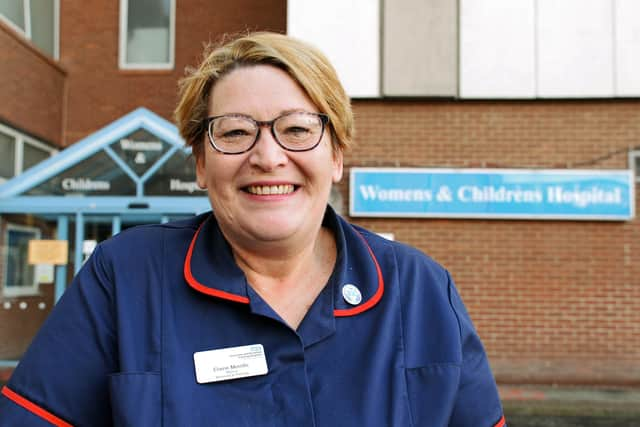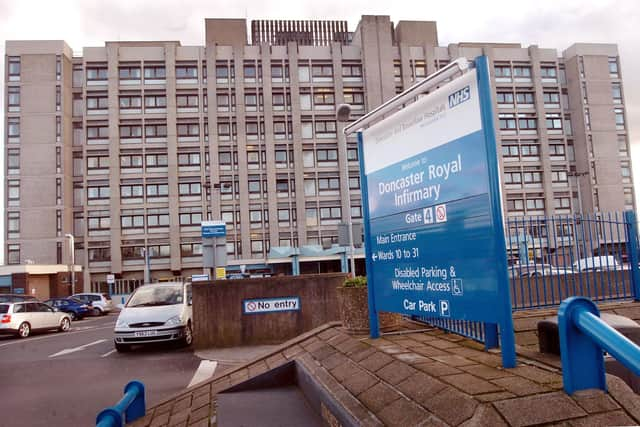Delivering babies in Doncaster car park ‘not unusual’ for midwife Elaine Merrills
and live on Freeview channel 276
Since she first went to work at the Doncaster Royal Infirmary in 1978, Elaine has helped bring in over 1,000 babies into the world– but she admits the first time terrified her.
She said: “It was a Saturday afternoon and I was on the later shift. You had to see 10 births before you could help a woman give birth, and I’d seen about 15 because I was really scared. Then one of the older midwives told me ‘you’re delivering this woman’. They took me down to the delivery room, and I was supported by the senior midwife. It was a little boy.
Advertisement
Hide AdAdvertisement
Hide Ad“I delivered her and then I just cried after I’d left the room. It was just that I had been so scared and it was really emotional. Crying like that is quite commonplace. You always remember the first one, and there are always ones that stick in your mind for good or bad reasons. And I think the woman never forgets their midwife.”


Births are not always in the department.
On occasions, there have been women who have not reached the women’s hospital before their baby is born.
And those are the times that Elaine has had to rush out to the car park to carry out the delivery in the vehicle, which she feels is not unusual.
“If someone has started pushing, you just go out to the car and take a delivery pack, with things like cord clamps for the umbilical cord, and towels.”
Advertisement
Hide AdAdvertisement
Hide Ad

She has also been involved in births where a worried parent or relative has phoned in saying the mum-to-be has gone into labour at home, then given step by step instructions on what to do to deliver the baby over the phone.
“In circumstances like that, in the cars or over the phone, the labour is usually really quick,” she said. “On the phone, we just talk them through it until an ambulance arrives.
“On the phone you can usually hear the woman in the background, and a panicking husband saying the baby’s coming. If it is at that stage it is a case of telling them to keep pushing. If they’re about to deliver at home, then the baby is coming. The problems tend to be more about managing labour. But women’s bodies are made for childbirth.”
Former Armthorpe School pupil Elaine first came to the Doncaster Royal Infirmary as a 16 year old cadet, and then trained from 1980 until 1983. Initially she applied to be a midwife because her best friend was doing the same. She got in, but her friend did not. She qualified as a midwife in 1984.
Advertisement
Hide AdAdvertisement
Hide AdShe stopped counting how many babies she had delivered at the end of the 1980s, with the number by then well into four figures.
She is now the matron for inpatients, taking reponsibility for making sure quality on the wards is high.
“It can be traumatic if things are not going right,” she said. “Emergency situations get your heart pumping. But you have to be resilient and have someone to turn to for support.”
Since she started at the hospital, she says the way babies are delivered has not changed, but the complexity of some of the cases have changed. There are more older mums and IVF mums than in the early 80s, which can make things more challenging in terms of looking after the mums before they give birth, and during the delivery. But she added: “It has never been safer to give birth than it is now.”
Advertisement
Hide AdAdvertisement
Hide AdMums now stay in hospital for less time after giving birth. When Elaine started they would stay in for three days after a normal birth. Now mums can be heading home with their babies in six hours if all is well.
And dads were not allowed in the delivery room – but now they are welcomed.
One of Elaine’s own daughters has followed her into the job – now working at the Jessop in Sheffield. She has three daughters, and all of them work for the NHS, and she says although she did not encourage her daughter into midwifery, she is proud that she followed her into the profession.
“It is a job you just fall in love with,” she said.
‘Never forget’ elephants
Last year Elaine and her colleagues appeared on the One Show with an appeal for people to knit hats for babies on their wards.
Advertisement
Hide AdAdvertisement
Hide AdA crew came up to film them, along with people knitting the hats, which were designed to indicate if the babies temperatures were too low. Red indicated too cold, amber improving, and green denoted normal.
After their appeal, they got hats from all over the world, including Australia and New Zealand.
Now they are appealing again – this time for elepants.
They are asking people to knit grey elephants for mums who have lost their babies. They will signify loss – and will be known as ‘never forget’ elephants.